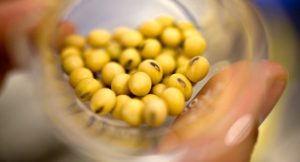Scientists at the Council for Scientific and Industrial Research (CSIR) have completed field trials on a GMO cowpea variety with inherent resistance to pest attack known as Bt cowpea.
The scientists at the Savannah Agric Research Institute (SARI) of the CSIR in Nyankpala near Tamale say the results of the trials are currently being reviewed after which processes to seek approval for commercial release will kick in.
According to the scientists, the Bt cowpea variety has shown a high level of resistance to the destructive maruca pod borer which can destroy up to four-fifth of yields on cowpea farms.
“It has been very difficult to control these pests because it has a cryptic feeding habit and you can get a very drastic reduction in your yield. It can cause yield loss of up to 80 per cent of farm yields. It feeds on the flower buds and flowers. And it’s difficult to spray them with chemicals,” Dr. Mumuni Abdulai who is Principal Investigator in charge of the Bt Cowpea Project explained.
Cowpea, popularly called beans is a common and important food in Africa. Nearly 200 million people consume it on the continent. It is rich in protein and has high energy content, making it a good source of nutrients for both humans and animals.
Destruction by the maruca pod borer pests has been responsible for very low yields on cowpea farms in Ghana. The pests are particularly dangerous because they damage not only the flowers and the buds but also destroys the pods, resulting in grain and yield loss.
”At a very young age, the pest causes destruction to the plants. They bore holes in the plants. It’s a very dangerous pest. We spray them every week for three months. That’s 12 times of spraying every season,” a cowpea farmer at Nyankpala in the Northern region of Ghana Ibrahim Lansah told Joy news.
But this could soon be a problem of the past when the Bt cowpea variety hits the market. Bt (Bacillus thuringiensis) is a naturally occurring bacteria that has the capacity to control a range of pests including maruca pod borer. Gene from the bacteria has been introduced in the cowpea to make it inherently resistant to pests.
Kenya based African Agricultural Technology Foundation (AATF) has been supporting the CSIR to produce these novel varieties to help save farmers from annual losses, ensure food security and boost protein consumption among the populace.
Promising results
After a decade of work, the trials in Ghana which began in 2008 is nearing an end with the completion of field tests. Results show the Bt cowpea uses fewer pesticides compared to conventional varieties but are highly productive.
“For field testing, when we deliberately subjected the crops to pest pressure, the one with Bt gene could give us up to 1300 kilograms per hectare. But the one without the Bt gene gave us only 74.1 kilograms per hectare. On the normal field, it’s a different outcome but the yield is still higher with the Bt giving more than five times the yield of conventional,” he added.
Some farmers in the northern part of the country who have had the chance to grow the varieties as part of the trials are equally impressed.
“The insect infestation is less with the Bt. The Bt varieties yield a lot more than the local varieties we have,” farmer at Nyankpala Ibrahim Lansah said. His colleague farmer Yusifu Abubakari explained; “we observed that if we use the Bt cowpea, we will have more money to feed our children. Because the yield at the trials was very good.”
Regulators say they are ready
State regulatory agency in charge of GMOs, the National Biosafety Authority says it is well equipped to adequately assess the first GMO crop before passing it for release onto the market.
“What we have done is to strengthen ourselves. We have signed MoU with some other regulatory institutions to get ourselves ready to do the risk assessments and to ensure that any GMO is safe for the public,” Chief Executive Officer of the Biosafety Authority Eric Okoree said.
He explained the National Biosafety Act 2011 passed by Parliament seven years ago has provided the necessary legal framework to allow for the safe introduction of GMOs onto the market.
Once the scientists put in an application for commercial release of the Bt cowpea varieties, the authority will have 180 days within which to give its approval.
Then the scientists could take the Bt cowpea seeds through the normal variety approval processes at the Ministry of Agriculture before it can be released onto the market.
Bt cowpea seeds will be public property
The scientists say the Bt cowpea variety will be delivered to farmers royalty-free as the license was donated to Ghana free of charge through a private-public partnership led by the AATF.
In the end, the state research body, Savannah Agricultural Research Institute (SARI) will have ownership of the variety without the control of any foreign firm. SARI will work with a local seed production company to multiply the seeds and get them out to farmers.
Plant Breeder at the Kwame Nkrumah University of Science and Technology Dr.Alexander Wireko Kena says farmers will have ownership over GMO seeds they buy and will have the right to replant them if they choose to.
“One of the strongest arguments against GMOs is that GMOs cannot be replanted. They say it a lot. But nothing is far from the truth. There is no current GM variety which has the terminator gene deployed in it. So every GM seed can be re-planted,” he explained.
–
myjoyonline




